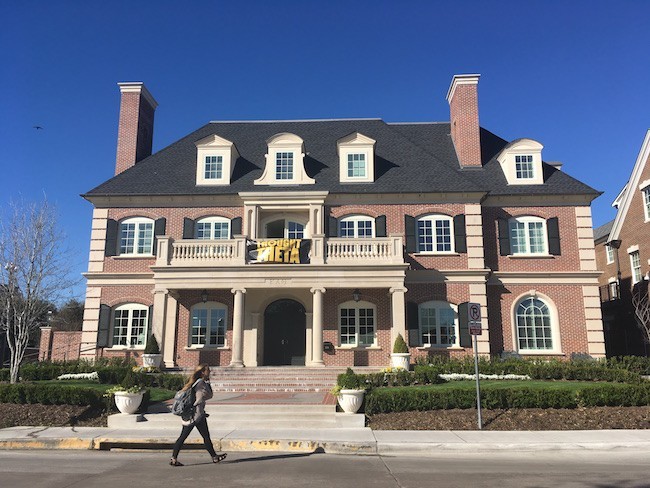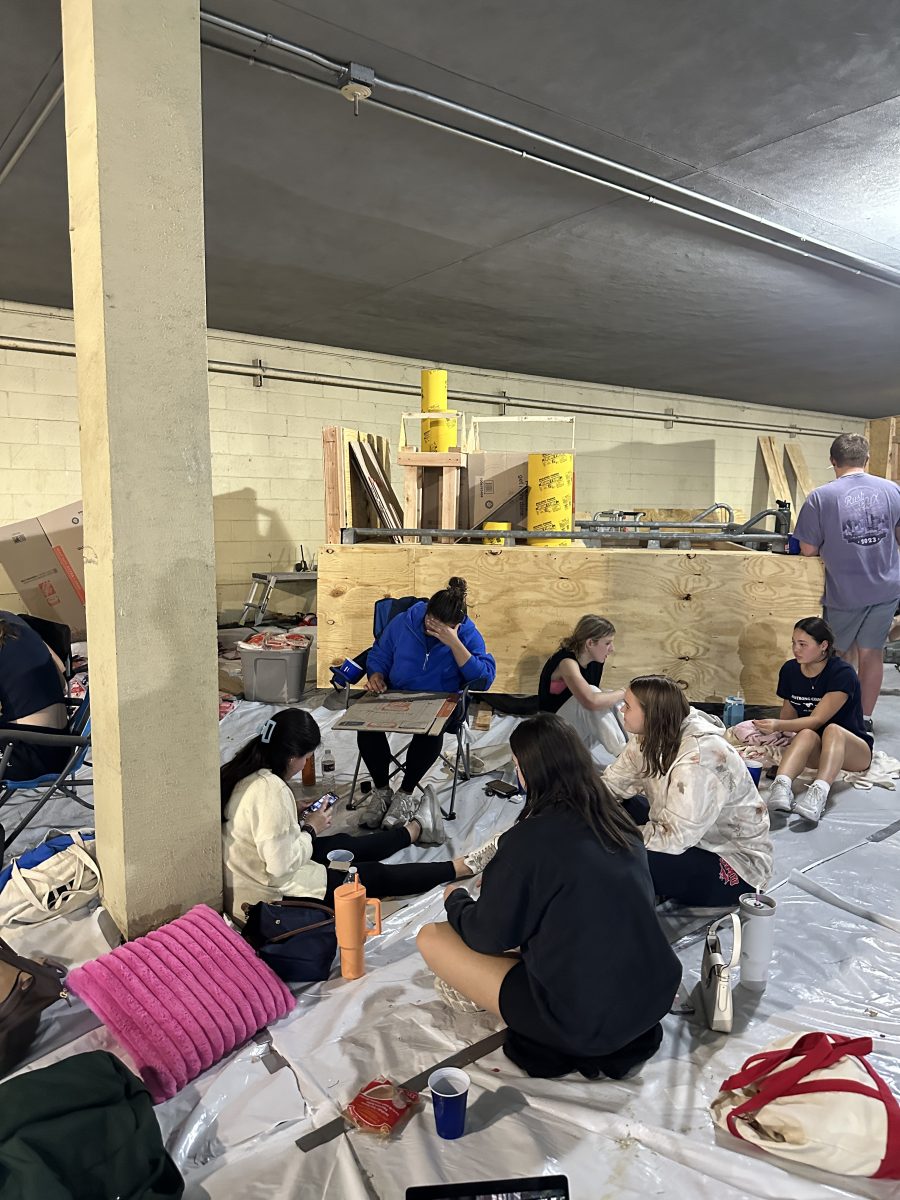Hazing allegations.
Lawsuits accusing the university of breach of contract and fraud.
A clandestine reformation of a sorority that once dominated SMU’s campus.
These are just some of the controversies that have surrounded SMU’s Kappa Alpha Theta chapter over the last two years.
Each action alone would have been a major controversy for any sorority or fraternity. But SMU’s Kappa Alpha Theta chapter was not just any sorority. Their recruitment process was one of the most cutthroat. Theta’s members were known to be some of the wealthiest students on an already wealthy campus. Their “THINK THETA” slogan was worn across the sweatshirts, stickers and pins of hundreds of members on campus. Thetas lived in one of the most expensive houses on sorority row, having been remodeled in 2016 for $7.3 million.
The new sorority house included a library dedicated to former first lady Laura Bush, one of its most notable alumni. She and her husband, former president George W. Bush, donated a painting of his to the sorority in 2017, where it hung in the library.
The wall that once held the painting is now bare. The library’s bookshelves are empty.
The DC asked Kappa Alpha Theta if Laura Bush was still a member of the sorority. The national organization does not share alumni status with nonmembers, a spokeswoman said.
Reports about hazing and forced alcohol consumption in February 2022 brought Theta’s reign to a halt. By July, Theta was suspended from campus.
For many students, Theta’s fall from grace was stunning.
Interfraternity Council President Bryce Tonkin was shocked at Theta’s removal because of its social status on campus but agreed with the university.
“Honestly, I just didn’t think it could happen,” Tonkin said. “But after hearing about their allegations, it made sense. And I think it was the right decision from the university.”
The controversial group “The Society” was formed in the wake of Theta’s suspension. The group originally dubbed themselves “Theta Society.” After pushback from Theta’s national organization over the use of the word “Theta,” the group cooperated and changed its name.
A year after their formation, the group is thriving. Dozens of new members joined last spring. They held parties with fraternities last year. They even have their own house.
But SMU is determined to dismantle the group. The university is threatening students who join “derecognized student organizations,” such as The Society, with probation, suspension, expulsion and more.
Over the summer, SMU added joining “derecognized student organizations” as a violation of the Student Code of Conduct.
Dean of Students Melinda Sutton said the provision is aimed towards groups who were removed from campus.
“In the past, there have been several examples of members of derecognized organizations attempting to continue the group’s activities by creating an alternative group under a different name,” Dean Sutton said. “This added provision to the Code is an attempt to address those types of situations.”
But The Society is prepared to push back.
Hazing reports in Kappa Alpha Theta
On Feb. 22, 2022, the university learned that Theta had hazed new members through forced consumption of alcohol at an off-campus location on Feb. 10, 2022, according to SMU’s Student Organization Conduct Status. New members were also exposed to activities that affected their health and safety, according to the report.
Struggles on campus to get hazing under control aren’t new. Archived Daily Campus articles document decades of hazing allegations involving alcohol, drugs, physical harm and more. Multiple Greek organizations have been removed from campus over the years because of allegations like these. And Theta had been previously sanctioned for the same violation nearly two years earlier in October 2020.
Shannon Williamson’s daughter, Claire, joined Kappa Alpha Theta in January 2022. She was a member of pledge class ‘22, the most recent group of new members to join the sorority. Almost two weeks after bid day, when students are officially invited to join a sorority, hazing allegations surfaced and SMU began looking into Theta.
What was supposed to be an exciting time in Claire’s collegiate life was soon cut short, Williamson said.
Williamson is a co-founder and advisor to The Society. Her daughter has been a member since the group’s formation.
The DC reached out to multiple former members of Kappa Alpha Theta to try to discuss what happened in February. Many declined. One former Theta and current member of The Society agreed to be interviewed. Wary of the university’s new conduct provision and potential consequences, she asked to remain anonymous.
Members and parents confided in Williamson about the events of Feb. 10. Williamson told the DC that members of Theta’s pledge class ‘22 were organized into groups and hazed by seniors at different locations in different ways. Many were forced to consume large amounts of alcohol and vomited. Some were blindfolded and told by older members that they were going to be branded. Some new members were on medications that could affect their ability to metabolize alcohol. The hazing was organized enough that older members carrying out the hazing were made aware of which girls were on medication in order to prevent severe medical issues. The anonymous student confirmed these hazing practices. Parents of other members told Williamson their daughters had to take their clothes off down to their underwear in front of male students while blindfolded.
Sorority girls being forced to undress is not an uncommon practice at SMU. Pi Beta Phi was accused of hazing last year after a video emerged of new members in their underwear with profanities written on them in black marker.
The night’s events astounded parents.
“I was shocked to hear that there was hazing of that magnitude taking place,” Williamson said
The anonymous member said she hadn’t realized the severity of hazing in Theta until Feb. 10.
“That night is when I thought, ‘Wow, this is actually happening right now,’” she said.
But the hierarchy in Theta between younger and older girls was palpable early on, she added.
“We felt afraid to speak up about things because [older members] set this power trip in place that we didn’t have much say,” the anonymous member said. “They would overdo it to intimidate us.”
The Society is different, she said.
“Since we’ve formed, it’s been a much more positive experience,” she said.
Another parent agreed to be interviewed by the DC in March 2023. She asked to remain anonymous in the story to protect her daughter’s identity. Her daughter was a member of Theta’s pledge class ‘22 and is also a current member of The Society.
“SMU has an enormous problem with hazing,” the unnamed parent said. “It’s pervasive, but it’s because they don’t do anything to stop it.”
No legal action was taken against the seniors who conducted the hazing in February 2022, she added.
University officials declined to discuss specific details about the investigation with the DC.
The investigation
The investigation into Theta officially began on April 8, 2022, according to the conduct website.
Rumors quickly spread throughout campus about what spurred the university into action. Cocaine and other illicit drug use. Performing sexual acts for fraternity members. Drugging new members. None of these rumors have been confirmed.
The investigation concluded on July 24.
The initial university sanctions stated that “the national organization Kappa Alpha Theta entered into a mutual agreement with SMU through May 15, 2026, that includes the suspension of the SMU chapter for a period of two years until May 15, 2024.”
This meant that SMU’s Theta chapter would no longer be able to host social events until May 2024 or recruit new pledge classes until January 2025 at the earliest.
The seniors who carried out the hazing had already graduated by the time the sanctions were put into place, said the unnamed parent who agreed to be interviewed. Members of pledge class ‘22 endured the punishment of senior members in their sorority through no fault of their own, she added.
The National Panhellenic Conference is the umbrella organization for dozens of different sororities across the nation. Seven sororities currently operate under its guidance on campus: Pi Beta Phi, Kappa Kappa Gamma, Alpha Chi Omega, Delta Delta Delta, Chi Omega, Gamma Phi Beta and Delta Gamma. SMU recently announced Alpha Delta Pi will join campus next year as Gamma Phi Beta exits.
The DC reached out to both current and former Panhellenic Executive Board members to ask questions about what happened with SMU’s Theta chapter in 2022. The DC received no response.
The national organization of Kappa Alpha Theta insisted on the SMU chapter’s suspension, the unnamed parent said.
Dean Sutton declined to speak on the specifics of the investigation into SMU’s Theta chapter and how the sanctions were decided. Kappa Alpha Theta CEO Jennifer Schmaltz did not respond for comment.
Members’ relationships with Theta are complicated because their removal from campus was so swift, the parents said.
“There was no love affair with Kappa Alpha Theta,” the unnamed parent said.
“It’s definitely sad sometimes driving by the house,” the anonymous member said. “But it’s not a very deep connection.”
Members were in disbelief at the sanctions.
“[After they were announced], my phone immediately started blowing up,” the anonymous member said. “At first, we just couldn’t process that it was true. Things happen in other fraternities and sororities and usually they get away with it.”
The hazing that occurred in Theta was unacceptable, the unnamed parent said. But there should be equal sanctions for all organizations when they are found guilty of hazing, she added.
“I think if everyone knew that hazing always resulted in suspension, they wouldn’t have felt so blindsided,” the unnamed parent said. “This hasn’t really happened [at SMU] with a sorority, and even with a lot of fraternities. I’m not arguing that [the suspension] shouldn’t have happened, but it should happen across the board.”
Williamson agreed and added that while a small group of seniors might have been at fault for the incident in 2022, it was a lack of oversight from SMU and Theta nationals that allowed the culture of hazing to perpetuate.
Parents file lawsuit against Theta for breach of contract, fraud
Lana Ambrose, also an advisor for The Society, agreed to an interview with the DC in February 2023. Ambrose’s daughter, Alexis, was also a member of Theta’s pledge class ‘22 and is now a member of The Society.
SMU told the former Theta members throughout the summer of 2022 that they would still be able to live in the sorority house, Ambrose said. In early August, that was no longer the case.
“The first two weeks of school, we were scrambling to find an apartment for [my daughter],” Lana Ambrose said.
Parents of former Theta members filed a lawsuit against the Kappa Alpha Theta nationals, SMU’s Beta Sigma chapter and the Beta Sigma Facility Corporation of Theta on July 26, 2022.
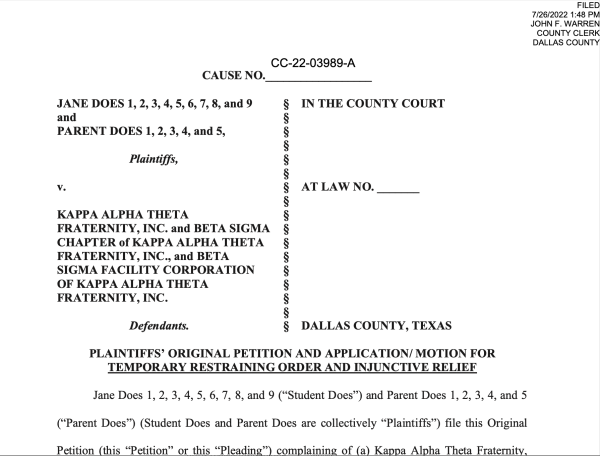
The Beta Sigma chapter of Kappa Alpha Theta is the official term for SMU’s Theta chapter. The lawsuit pitted parents of former Theta members against the national Theta organization, SMU’s Theta chapter and the housing corporation for SMU Theta.
SMU now uses the Theta house for “luxury housing for women.”

The suit alleged a breach of contract against the Beta Sigma chapter and Theta nationals in regard to the plaintiff’s housing contracts.
Parents alleged they paid the housing deposits and followed protocols, such as signing housing contracts that indicated their daughters would reside in the Theta house. Theta indicated it may terminate the housing contracts and “encouraged” the plaintiffs to find alternate housing.
The suit also alleged Theta represented the housing contracts in bad faith.
When it was determined that the lawsuit would drag on, parents dropped the suit, said Williamson, who was one of the plaintiffs.
According to Dallas County court documents, several plaintiffs have filed for nonsuit, or dismissal. The case is technically still active for two plaintiffs, but nothing has been filed since August.
The DC reached out to the law firm representing the parents to clarify the status of the case. The firm did not immediately respond for comment.
The formation of The Society
In August 2022, parents of ex-Theta members decided to form a group called “Theta Society” as a way for their daughters to continue to have the social lives they had hoped for by joining a sorority, Williamson said.
“We founded the nonprofit because we knew we did not want to be underground. That was very important to us, for the girls,” Williamson said.
Kappa Alpha Theta nationals reached out to the organization in November 2022 and told them they could not use the word “Theta” in their name, Williamson said.
The Society sought input from attorneys about using the word “Theta” prior to naming the group and thought it wouldn’t pose a legal issue. However, after being asked by nationals to not use it, the organization obliged and changed its name to The Society.
After the group changed its name, Theta CEO Jennifer Schmaltz released a statement in March 2023 saying the similarities between Theta and The Society caused a delay in Theta’s return to the university until Fall 2025 at the earliest.
“Until the group ceases to exist, the return of Beta Sigma chapter will continue to be delayed,” the statement said.
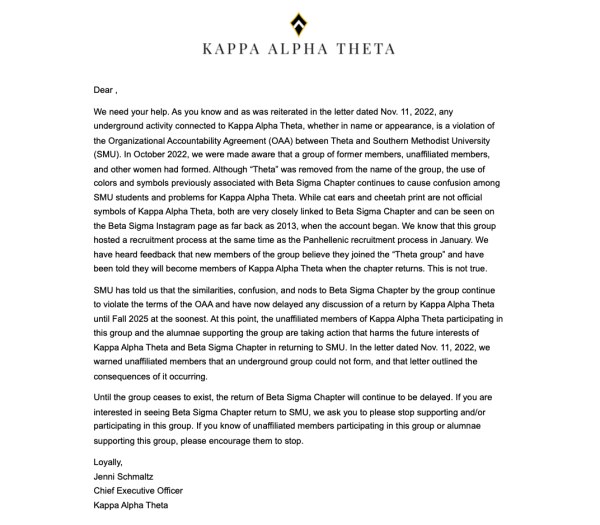
The statement said despite the name change, the group continued to cause confusion about possible ties to Theta, noting their use of cat ears and cheetah print, symbols SMU’s Theta chapter frequently used and The Society still uses. These symbols can be seen on both SMU Theta and The Society’s Instagram accounts.
However, The Society does not use Theta’s national symbols, like the kite and the pansy.
There are other similarities between The Society and Panhellenic sororities. Meetings on Monday nights. Members being assigned ‘bigs’ and ‘littles’. Philanthropic causes. Self-dubbed “sisterhood events”. Semester fees, which are around $1,500, were referred to as “dues” in the interview with the unnamed parent. The same parent also referred to the founding member class of The Society as a “pledge class” multiple times, at one point calling new members “pledges” before insisting that wasn’t the proper term to use.
But Williamson said this doesn’t matter.
“Listen, we know it’s suspect because of the way it appears,” she said. “A group gets kicked off campus and comes back with a different name. I get that. But all of those girls who did the major hazing are gone. They all graduated before we started this group.”
Some disagree and say these similarities do matter.
“I think The Society has been a blight on Greek life,” Tonkin said. “I think it’s really harmed how the administration views Greek life and how the rest of the community views Greek life.”
The Society is a registered 501(c)(3) nonprofit and registered as a public charity. Formed in August 2022, the organization “is run by a group of young women focused on empowering women to be safe, independent and strong,” according to its social media.
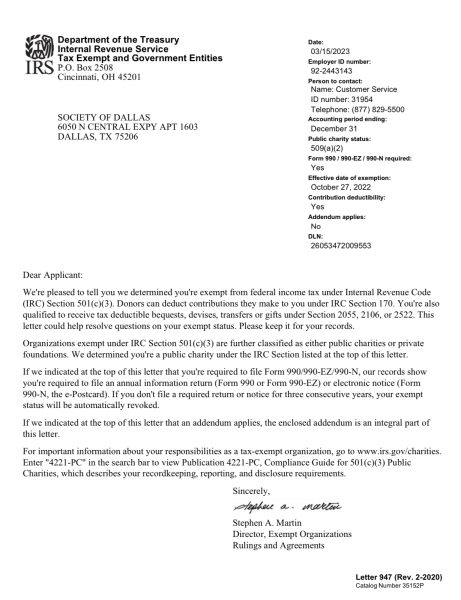
Members of pledge classes prior to pledge class ‘22 were able to join The Society as honorary members. Members of pledge class ‘22 are considered founding members. Founding members were able to vote on who joined The Society as an honorary member.
SMU adds joining “derecognized student organizations” as a conduct violation
Dean Sutton declined to answer whether or not the Code of Conduct provision about ‘derecognized student organizations’ was added specifically because of The Society.
Tonkin, who also sits on the Vice President of Student Affairs Advisory Board, believed The Society’s actions on campus last year did impact the timing of the provision.
SMU senior Sarah Nguyen said the provision was necessary.
“If SMU continued to witness an unrecognized group…it sets a precedent that harmful behavior is acceptable,” Nguyen said.
But the anonymous member said The Society is safer than Theta ever was.
“It’s a much more positive experience than the [hierarchy] in Theta,” she said.
The DC reached out to several other members in various Greek organizations to discuss how Theta’s suspension and The Society have changed the Greek system at SMU. Many times, the DC received no response.
On Sept. 26, at a Panhellenic meeting mandatory for the hundreds of women going through the formal recruitment process in spring 2024, SMU Director of Fraternity and Sorority Life Ashley Fitzpatrick brought up the provision.
“SMU does not want students engaging with derecognized student organizations,” Fitzpatrick said. “I particularly bring this up because I want to address The Society. This is an organization not recognized by SMU and there are inherent risks with joining.”
Fitzpatrick said joining The Society could affect a student’s standing at the university.
On page 11 of the Student Code of Conduct, SMU lists joining a derecognized student organization as a violation if students:
“… knowingly affiliate with groups, teams, or organizations that have had their University recognition or registration withdrawn, suspended or permanently revoked by the University for disciplinary reasons. The definition of affiliation includes joining, rushing, pledging or being involved in any activity that would normally be associated with being a member of such an organization. This applies to organizations that were created by members of a de-recognized organization in an attempt to continue its presence on campus. Individual students and/or student organizations may be held responsible for providing assistance to or in any way perpetuating the activities of a group/organization that has lost university recognition.”
Dean Sutton would not answer whether SMU would be pursuing expulsion for students who join The Society.
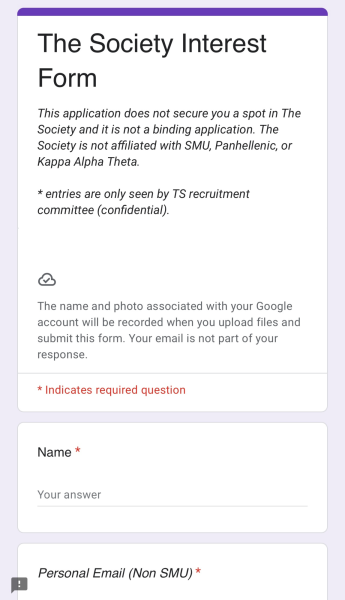
“If a student joined a derecognized student organization, the range of actions are those included in the [pages 18-21],” Dean Sutton said. “The exact action would depend on the particular circumstances and if there were mitigating factors.”
The Society intends on taking new members in the spring that are willing to take on the risk of potential conduct violations, the anonymous member said.
“We think SMU could be bluffing,” she said. “So we are still moving forward. We want to take new girls.”
The Society posted an interest form on Instagram Sunday night, asking girls to fill out questions about why they are interested in the group and its mission.
SMU might not understand the level of involvement and oversight from parents in the group, the anonymous member said.
“With our parents being advisors [of The Society] and watching over us, there is so much more supervision than there ever was in my Theta experience,” she said.
But Delta Gamma Paris Sellers agrees with the university’s provision.
“I think [the provision] was the university’s last resort to try and remove The Society from campus,” Sellers said.
In the past, fraternities have been kicked off campus and continued to operate “underground” and SMU looked the other way, Sellers added. But The Society is different, she said. It’s visible and clearly operating out in the open, Sellers explained.
Some fraternities have been approached by SMU and were told if they associated with The Society, they would be punished, Williamson said.
Dean Sutton confirmed that an organization’s standing could be impacted if they are involved with The Society.
Following the formal recruitment process at SMU each January, fraternities and sororities enter into what they call “mixer season.” A fraternity will host a party and invite a sorority, giving the new pledge classes in both organizations a chance to meet one another. The organizations switch off who they “mix” with each night and mix with various organizations.
Last year, several fraternities held mixers with The Society. IFC is instructing fraternities not to hold mixers with the group this year, Tonkin confirmed.
Last year, fraternities seemed to treat The Society normally, the same way they would have treated Theta, the anonymous member of The Society said.
“It was the same group of girls they always knew and were friends with,” she said. “Nothing had changed until SMU put in that conduct rule and started to threaten them.”
The Society doesn’t want to jeopardize fraternities’ standing on campus, the anonymous member added, but intends on socializing with them in some way in the spring.
Parents criticize SMU’s response to hazing
Parents of former Theta members said SMU’s response to hazing is indiscriminate. The problem is pervasive, they said.
“All three of my children have been hazed at SMU,” Williamson said.
Ambrose reflected on Pi Phi’s investigation after a hazing allegation last February.
“There are circumstances where [SMU] doesn’t have consistency,” she said. “There’s not really any set rules for anyone to follow.”
Pi Phi was accused of hazing and alcohol violations in the university’s conduct investigation, similar to Theta. Their university sanction status is still marked as pending on the conduct website, which says it was updated on Aug. 7, 2023. However, Pi Phi was still able to initiate their new members at a later date in spring 2023, and their social and recruitment events on campus have continued.
Many additional Greek organizations have faced a variety of sanctions over the last several years for hazing.
Delta Delta Delta was found responsible for hazing in spring 2021 for causing new members shame or humiliation.
Sigma Nu was found responsible for hazing in fall 2021 for forcing new members to participate in calisthenics and requiring certain attire and communication methods.
Beta Theta Pi was found responsible for hazing in spring 2020 for requiring members to send pornographic images to each other, and in spring 2021 and 2023 for requiring new members to perform calisthenics, consume distasteful food and perform acts of servitude.
Phi Gamma Delta was found responsible for hazing new members in spring 2018 through forced testing of chapter history in dark rooms.
Sigma Alpha Epsilon was found responsible for hazing new members in spring 2017 through servitude and possible physical abuse.
These organizations still operate on campus.
Kappa Alpha Theta was found responsible for hazing in another incident involving alcohol in fall 2020.
Pi Kappa Alpha was found responsible for hazing new members in spring 2018 by forcing them to consume distasteful substances.
Kappa Alpha Order was found responsible for hazing new members in fall 2017 through paddling, servitude, forced consumption of alcohol and various foods and liquids until vomiting was induced, forcing members to wear clothing soiled with vomit, sleep deprivation and “underground” membership.
None of these organizations operate on campus anymore.
In a national study by the University of Maryland, researchers found that in 95% of hazing cases, students who were aware they had been hazed did not report it.
Parents say the lack of strict guidelines for punishing organizations that haze makes the problem worse.
“[SMU’s response to hazing] is completely reactive and not even appropriately so,” the unnamed parent said. “They need to have clear and concise definitions of what constitutes hazing and have resolute repercussions.”
Williamson, Ambrose and the unnamed parent agreed that SMU’s sanctions for the various organizations that have faced hazing allegations seem to be across the board.
Dean Sutton told the DC last spring that the majority of hazing reports to SMU are anonymous and often vague, making them difficult to investigate.
Dean Sutton said the university is continuing to try to address the issue of hazing on campus.
SMU recently launched a Wellbeing Commission, and a Hazing Sub-Committee was formed, she said.
“We recently joined the Hazing Prevention Consortium out of the University of Maine,” Dean Sutton added. The program is “a three-year commitment focused on assessing our current environment related to hazing and implementing interventions that will help to curb hazing behavior on campus.”
The university has invited several speakers to campus to discuss the dangers of hazing. Tonkin said this has been effective because it shows Greek members the real consequences of hazing rather than lecturing them on the topic.
Parents plan to file lawsuit against SMU in response to Code of Conduct provision
Parents of members in The Society believe SMU’s Code of Conduct provision is against the law.
Making it a conduct violation to join an off-campus group unaffiliated with SMU could be illegal, Williamson said. The Society is seeking legal counsel to evaluate if SMU is within its rights to tell students what they can be involved in off-campus, she said.
Parents hope the university progresses in their handling of hazing and hazing investigations.
“I’m not advocating for getting rid of the system,” the unnamed parent said. “But it has to be better controlled.”



